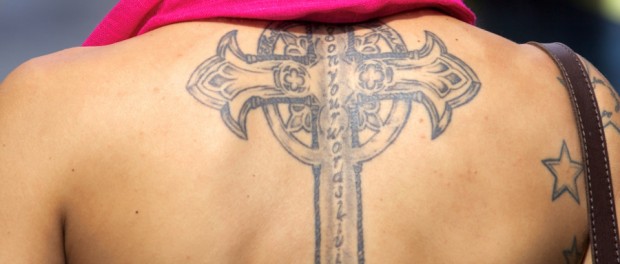Under the Needle – Tattoos in the Bible

It wasn’t that long ago when a man with tattoos would be shunned by society at large and likely barred from most churches. Today, getting ink done is far more widely accepted, even in much of the church.
Religion itself is a mainstay in body art motifs. From crosses to praying hands, from angels to demons, the most devout of young worship leaders to the most rebellious of heathens both can face the temptation to permanently imprint religious (even Christian) symbols on their body. But hasn’t the church often held the position that tattoos are sinful? If any tattoo is sinful, how can getting a laughing Jesus tattooed on your bicep be acceptable? What do we find about tattoos in the Bible anyway?
Lawful Origins
Let’s dig into the Law a little bit.
The origins of this belief come from that stumbling block of all new Bible-in-one-year readers: Leviticus. I’ve only ever known one person to be thrilled by the details itemized in this book of the Law. He was a lawyer, so he found the historical predecessor to his day-to-day life fascinating. For the rest of us, Leviticus can be a chokepoint, but the church often uses its many specifications to define expectations of behavior, life decisions, and—in this case—art.
In chapter 19 verse 28, the Law states “You shall not make any cuts in your body for the dead nor make any tattoo marks on yourselves; I am the Lord.” Wow, it doesn’t get more cut-and-dry than that!
This command comes amid seemingly unrelated commands about trimming facial hair, eating blood, and making one’s daughter a prostitute. Yet a bit of digging reveals that these are not unusual pairings (see Leviticus 21:1,5; Deuteronomy 14:1; and Jeremiah 16:6). These apparently randomly-selected rules each addressed common idolatrous practices within the region. Speaking about cuttings and markings, Matthew Henry comments, “The heathen did so to pacify the infernal deities they dreamt of, and to make them propitious to their deceased friends.”
In short, heathen customs included head shaving, body painting, and “making deep gashes on the face and arms and legs in times of bereavement” (as summarized in the Jamiesson Fausset Brown Commentary).
What About Tattoos?
These idolatrous customs did not, however, include making tattoos as we know them today; such tattoos did happen but had completely different meanings culturally. According to Dr. James Buswell, III of William Carey International University, the application of this command to modern tattooing is “from conjecture not based on ethnological inference.”
But doesn’t the Word actually say “tattoo”? Well, that is how it is written in many translations, but the Hebrew word appears exclusively in this context in the canon, leaving translators to make word decisions based on interpretation rather than direct translation or contextual comparisons. Given this and the total lack of evidence that the act of tattooing fits into the context of idolatrous actions related to death or mourning, this translation is considered suspect by many scholars. More likely, this word is referring to the painting of the body (with clay and the like) as part of the heathen mourning rituals (for which evidence does exist).
Even many Jews have come to similar conclusions about the application to modern idea of tattoos, even if we do accept this translation. The wildly popular layperson’s guide to Judaism’s many beliefs and customs The Second Jewish Book of Why notes, “Since tattooing in modern times involves pricking the skin rather than cutting into it, and since idolatry is no longer practiced among civilized people, there is some doubt whether the biblical ban against it applies today.”
The Inked Christian
As for us Christians, like so much else in our spirit-rather-than-letter paradigm, the real question lies more internally than externally. The whys, not the whats.
Dr. R. Laird Harris, Professor Emeritus of the Old Testament at Covenant Theological Seminary wrote, “There was nothing morally wrong with cutting the hair of the beard or with tattooing. But these practices then, and also now in some places, were parts of heathen ritual.”
So here’s the question: why do you want that tattoo? If it’s for a heathen ritual, I’d say you’re infringing on the spirit of Leviticus 19:28, if not the letter. If it’s to affix a permanent, prominent cross or other Christian symbol to your person to glorify God as a part of your testimony, I wouldn’t worthy about the letter of the Law too much.
Even if it’s permitted, there’s something to be said for wisdom and discretion about location and subject matter. Know that your ink will represent you to whoever sees it, and therefore it represents whoever you represent (your family, your potential employer, God). Visible tattoos, even of godly imagery, can adversely affect job interviews, sales efforts, and other interpersonal communication. Plus there’s always the risk of body size/shape change over time (Tweety becomes Big Bird).
Here’s a good rule of thumb: consider a waiting period if you’re considering a tattoo. It’s permanent, and what’s cool to you today might not be so cool twenty years from now. Or to those to whom you witness.
Originally posted 2015-11-06 08:00:46.


Leave a Reply